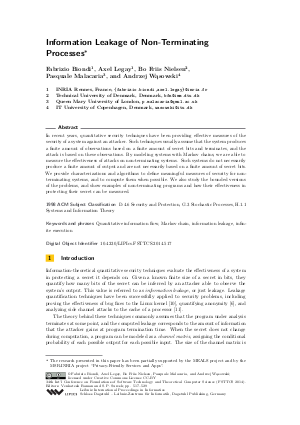Information Leakage of Non-Terminating Processes
Authors Fabrizio Biondi, Axel Legay, Bo Friis Nielsen, Pasquale Malacaria, Andrzej Wasowski
-
Part of:
Volume:
34th International Conference on Foundation of Software Technology and Theoretical Computer Science (FSTTCS 2014)
Part of: Series: Leibniz International Proceedings in Informatics (LIPIcs)
Part of: Conference: IARCS Annual Conference on Foundations of Software Technology and Theoretical Computer Science (FSTTCS) - License:
 Creative Commons Attribution 3.0 Unported license
Creative Commons Attribution 3.0 Unported license
- Publication Date: 2014-12-12
File

PDF
LIPIcs.FSTTCS.2014.517.pdf
- Filesize: 0.61 MB
- 13 pages
Document Identifiers
Subject Classification
Keywords
- Quantitative information flow
- Markov chain
- information leakage
- infinite execution
Metrics
- Access Statistics
-
Total Accesses (updated on a weekly basis)
0PDF Downloads0Metadata Views
Abstract
In recent years, quantitative security techniques have been providing effective measures of the security of a system against an attacker. Such techniques usually assume that the system produces a finite amount of observations based on a finite amount of secret bits and terminates, and the attack is based on these observations. By modeling systems with Markov chains, we are able to measure the effectiveness of attacks on non-terminating systems. Such systems do not necessarily produce a finite amount of output and are not necessarily based on a finite amount of secret bits. We provide characterizations and algorithms to define meaningful measures of security for non-terminating systems, and to compute them when possible. We also study the bounded versions of the problems, and show examples of non-terminating programs and how their effectiveness in protecting their secret can be measured.
Cite As Get BibTex
Fabrizio Biondi, Axel Legay, Bo Friis Nielsen, Pasquale Malacaria, and Andrzej Wasowski. Information Leakage of Non-Terminating Processes. In 34th International Conference on Foundation of Software Technology and Theoretical Computer Science (FSTTCS 2014). Leibniz International Proceedings in Informatics (LIPIcs), Volume 29, pp. 517-529, Schloss Dagstuhl – Leibniz-Zentrum für Informatik (2014)
https://doi.org/10.4230/LIPIcs.FSTTCS.2014.517
BibTex
@InProceedings{biondi_et_al:LIPIcs.FSTTCS.2014.517,
author = {Biondi, Fabrizio and Legay, Axel and Nielsen, Bo Friis and Malacaria, Pasquale and Wasowski, Andrzej},
title = {{Information Leakage of Non-Terminating Processes}},
booktitle = {34th International Conference on Foundation of Software Technology and Theoretical Computer Science (FSTTCS 2014)},
pages = {517--529},
series = {Leibniz International Proceedings in Informatics (LIPIcs)},
ISBN = {978-3-939897-77-4},
ISSN = {1868-8969},
year = {2014},
volume = {29},
editor = {Raman, Venkatesh and Suresh, S. P.},
publisher = {Schloss Dagstuhl -- Leibniz-Zentrum f{\"u}r Informatik},
address = {Dagstuhl, Germany},
URL = {https://drops.dagstuhl.de/entities/document/10.4230/LIPIcs.FSTTCS.2014.517},
URN = {urn:nbn:de:0030-drops-48683},
doi = {10.4230/LIPIcs.FSTTCS.2014.517},
annote = {Keywords: Quantitative information flow, Markov chain, information leakage, infinite execution}
}
Author Details
References
-
S. Akshay, Joël Ouaknine, Timos Antonopoulos, and James Worrell. Reachability problems for Markov chains. Personal communication, November 2013.

-
Mário S. Alvim, Miguel E. Andrés, and Catuscia Palamidessi. Quantitative information flow in interactive systems. Journal of Computer Security, 20(1):3-50, 2012.

-
Michael Backes, Goran Doychev, and Boris Köpf. Preventing side-channel leaks in web traffic: A formal approach. In NDSS. The Internet Society, 2013.

-
Fabrizio Biondi, Axel Legay, Pasquale Malacaria, and Andrzej Wasowski. Quantifying information leakage of randomized protocols. In Roberto Giacobazzi, Josh Berdine, and Isabella Mastroeni, editors, VMCAI, 2013.

-
Fabrizio Biondi, Axel Legay, Bo Friis Nielsen, and Andrzej Wasowski. Maximizing entropy over Markov processes. In Adrian Horia Dediu and Carlos Martín-Vide, editors, LATA, 2013.

-
Konstantinos Chatzikokolakis, Catuscia Palamidessi, and Prakash Panangaden. Anonymity protocols as noisy channels. Inf. Comput., 206(2-4):378-401, 2008.

-
Tom Chothia, Yusuke Kawamoto, Chris Novakovic, and David Parker. Probabilistic point-to-point information leakage. In CSF, pages 193-205. IEEE, 2013.

-
T. M. Cover and J. A. Thomas. Elements of Information Theory. Wiley, 2012.

-
George Danezis, Roger Dingledine, and Nick Mathewson. Mixminion: Design of a type iii anonymous remailer protocol. In IEEE Symposium on Security and Privacy, pages 2-15. IEEE, 2003.

-
Jonathan Heusser and Pasquale Malacaria. Quantifying information leaks in software. In C. Gates, M. Franz, and J. P. McDermott, editors, ACSAC, pages 261-269. ACM, 2010.

-
Boris Köpf, Laurent Mauborgne, and Martín Ochoa. Automatic quantification of cache side-channels. In P. Madhusudan and S. A. Seshia, editors, CAV, pages 564-580. Springer, 2012.

-
Pasquale Malacaria. Assessing security threats of looping constructs. In Martin Hofmann and Matthias Felleisen, editors, POPL, pages 225-235. ACM, 2007.

-
J. L. Massey. Guessing and entropy. In Proc. of the 1994 IEEE International Symposium on Information Theory, page 204, June 1994.

-
Joël Ouaknine. Decision problems for linear recurrence sequences. In L. Gasieniec and F. Wolter, editors, FCT, volume 8070 of LNCS, page 2. Springer, 2013.

-
Joël Ouaknine and James Worrell. Positivity problems for low-order linear recurrence sequences. In Chandra Chekuri, editor, SODA, pages 366-379. SIAM, 2014.

-
Geoffrey Smith. On the foundations of quantitative information flow. In Luca de Alfaro, editor, FOSSACS, volume 5504 of LNCS, pages 288-302. Springer, 2009.

-
Hirotoshi Yasuoka and Tachio Terauchi. On bounding problems of quantitative information flow. Journal of Computer Security, 19(6):1029-1082, 2011.

